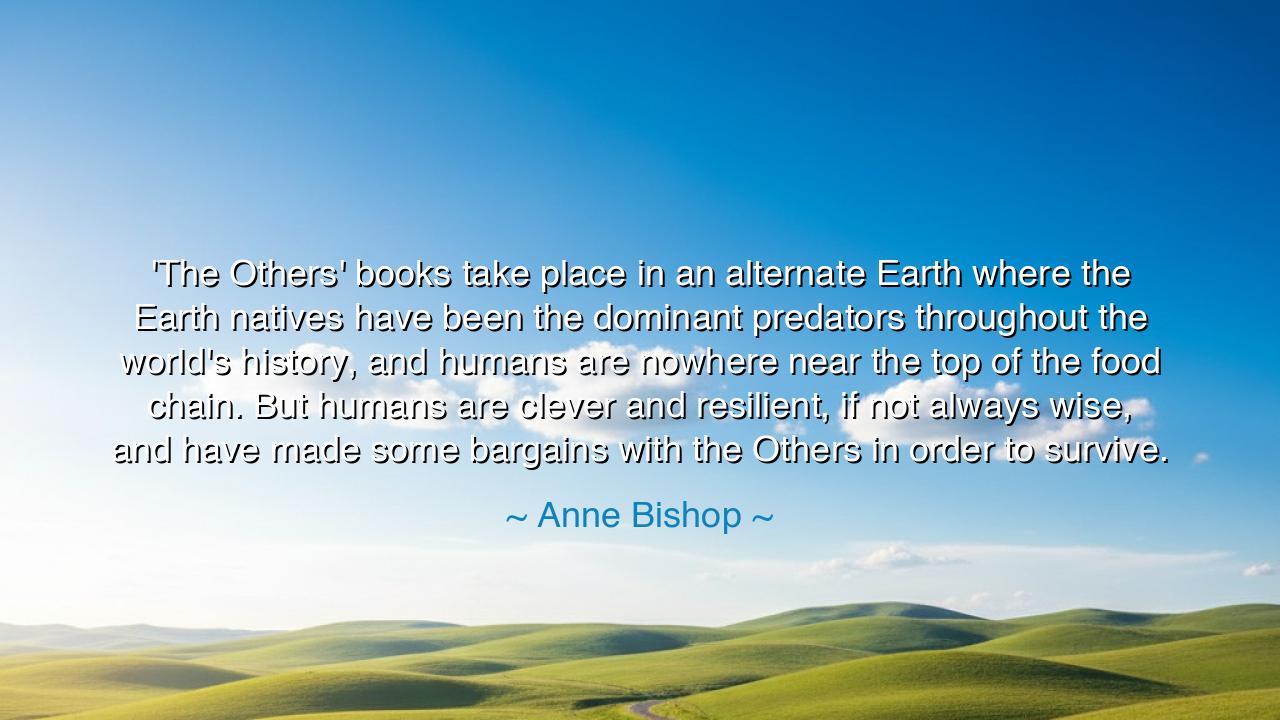
'The Others' books take place in an alternate Earth where the
'The Others' books take place in an alternate Earth where the Earth natives have been the dominant predators throughout the world's history, and humans are nowhere near the top of the food chain. But humans are clever and resilient, if not always wise, and have made some bargains with the Others in order to survive.






The gentle hum of the café filled the air, blending with the rhythmic tapping of rain against the window. Jack sat across from Jeeny, his coffee cup cradled in his hands, staring out at the rain-soaked streets. Jeeny, sitting opposite him, seemed lost in thought, her fingers lightly tracing the rim of her cup.
Host: After a moment of silence, Jeeny spoke, her voice intrigued, with a touch of curiosity.
Jeeny: “I came across a quote from Anne Bishop today that really made me think. She said, ‘The Others' books take place in an alternate Earth where the Earth natives have been the dominant predators throughout the world's history, and humans are nowhere near the top of the food chain. But humans are clever and resilient, if not always wise, and have made some bargains with the Others in order to survive.’ What do you think she means by this? Do you think it's about the fragility of human existence and how we navigate the world with those in power?”
Jack: He looked up, a thoughtful expression crossing his face. “I think Bishop is exploring a world where humans aren’t at the center of everything, where they don’t automatically hold the power position. The Others are the dominant predators, and humans have had to find ways to survive by negotiating with those more powerful forces. It’s about how clever and resilient humans can be when faced with danger or an overwhelming force, but also about the compromises they make in order to survive. It’s not a story about humans conquering or dominating—it’s about survival and adaptation in the face of much greater challenges.”
Jeeny: “Exactly. It’s a reversal of the usual narrative where humans are at the top of the food chain and control the environment around them. In this alternate Earth, humans have to negotiate their existence with those who are much more powerful than them. And I think there’s a deeper commentary here about humanity’s resilience—that even when faced with overwhelming odds, we find a way to adapt and survive, even if it means making bargains with those we might normally see as enemies or threats. It’s a reminder of how clever and resourceful humans can be when pushed to their limits.”
Host: The rain outside had softened, leaving a quiet stillness between them. Jack shifted slightly, his fingers still resting on his coffee cup as he continued.
Jack: “Right. And I think it also touches on the idea of humility. In this world, humans can’t just rely on their strength or dominance. They have to work with the Others, acknowledging their vulnerability and finding ways to coexist with those more powerful. It’s a stark contrast to the way we often see human history—where dominance and control are central themes. In Bishop’s world, survival comes through cooperation, even with those who might seem like enemies at first. It’s about negotiating power dynamics and understanding your place in the world.”
Jeeny: “Yes, and it’s interesting because humans in this world are still portrayed as resilient, even though they aren’t in control. They have to rely on their intelligence and ability to form relationships, to make deals, to survive. It’s a reminder that wisdom isn’t just about being powerful or dominant; sometimes, it’s about knowing when to make compromises, when to collaborate, and when to find new ways to coexist. It’s about learning how to navigate a world where you’re not necessarily the most powerful being, but you can still carve out a place for yourself through your cleverness and resilience.”
Host: The conversation seemed to deepen, as they both reflected on the themes of power and survival. Jack set his coffee cup down gently, his expression softening.
Jack: “Exactly. Bishop’s world challenges us to think about power in a different way—how survival isn’t just about being at the top, but about being adaptive and cooperative. It’s about recognizing that there are forces in the world greater than us, and sometimes, the way forward isn’t through conquest but through compromise and mutual respect. It’s a powerful reminder that our strength often comes not from what we can control, but from how we respond to the forces around us.”
Jeeny: Her smile was small but filled with understanding. “Yes. And I think that’s what makes this world so intriguing. It’s a world where survival depends on humans’ ability to think outside of their traditional notions of power, and instead, they rely on their resourcefulness and the relationships they build with those more powerful. It’s about finding strength not just in dominance, but in coexistence and adaptation.”
Host: The rain had stopped, leaving a quiet calm in the café. Inside, Jack and Jeeny sat in the realization that power is often not about dominance, but about how we adapt, cooperate, and negotiate our way through a world that may seem overwhelming. Anne Bishop’s words remind us that survival is sometimes about recognizing our vulnerability, being clever and resilient, and finding ways to work together—whether with allies or with those we might perceive as threats. The world is full of challenges, but it’s our ability to adapt and cooperate that often leads us to the greatest success.






AAdministratorAdministrator
Welcome, honored guests. Please leave a comment, we will respond soon